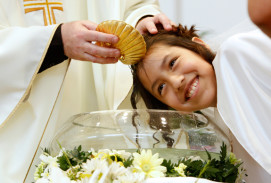Recently, a young priest in the Archdiocese of Detroit had the opportunity to watch the home video of his baptism. As he viewed the almost 30-year-old video, he was surprised to hear the officiant at the baptism, a permanent deacon of the Archdiocese of Detroit, utter a phrase that is not in the Rite of Baptism.

Instead of stating, “I baptize you in the Name of the Father and of the Son and of the Holy Spirit,” the deacon stated, perhaps in an attempt to be egalitarian or inclusive, perhaps in his mind to emphasize the role of the community in the celebration of the sacrament of baptism, “We baptize you in the Name of the Father and of the Son and of the Holy Spirit.”
This may seem like a minor matter, but it really isn’t. The simple changing of the pronoun from singular to plural caused a major problem. The sacrament of baptism was not valid.
People who were baptized with this formula were not baptized into the faith. For that reason, the other sacraments they received were invalid.
However, those who sought sacra- ments in good faith were not robbed of God’s grace. The letter from the archdiocese pointed out that St. Thomas Aquinas instructed that while God has bound Himself to the sacraments, He is not bound by the sacraments.
In the case of this young priest who discovered the problem, his ordination to the diaconate and the priesthood were invalid. He had to be rebaptized, reconfirmed, re-ordained a deacon, and then ordained a priest again.
Words matter in the celebration of the Sacraments, and every word that the Church gives us in the rituals matters. Sacraments are made up of both matter and form.
The Catechism of the Council of Trent states: “Every Sacrament consists of two things, matter, which is called the element, and form, which is commonly called the word.”
These words are not optional. They are carefully chosen and yes, even carefully translated. To alter these words in any way is a very serious thing.
This whole unfortunate incident is a reminder to all of us, both lay and clerical, of the importance of following the proper rituals authorized by the Catholic Church in the celebration of the Sacraments.
It’s not just being pharisaical or legalistic. As one priest blogger phrases it as a reminder to other priests and deacons: “Say the Black, do the Red” when it comes to what is written and prescribed by the Church in missals and other ritual books.
May all clerics have the common sense and the humility to celebrate and to officiate at the Sacraments as the Church requires.
